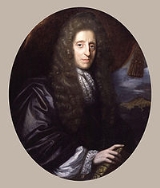
, was an English philosopher and physician regarded as one of the most influential of Enlightenment
thinkers. Considered one of the first of the British empiricists
, following the tradition of Francis Bacon
, he is equally important to social contract
theory. His work had a great impact upon the development of epistemology and political philosophy
.
If any man err from the right way, it is his own misfortune, no injury to thee; nor therefore art thou to punish him in the things of this life because thou supposest he will be miserable in that which is to come.![]()
To love truth for truth's sake is the principal part of human perfection in this world, and the seed-plot of all other virtues.![]()
New opinions are always suspected, and usually opposed, without any other reason but because they are not already common.![]()
There cannot any one moral Rule be propos'd, whereof a Man may not justly demand a Reason.![]()
No man's knowledge here can go beyond his experience.![]()
Since sounds have no natural connection with our ideas ... the doubtfulness and uncertainty of their signification ... has its cause more in the ideas they stand for than in any incapacity there is in one sound more than another to signify any idea.![]()
He that uses his words loosely and unsteadily will either not be minded or not understood.![]()
I doubt not, but from self-evident Propositions, by necessary Consequences, as incontestable as those in Mathematics, the measures of right and wrong might be made out.![]()

